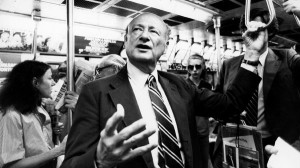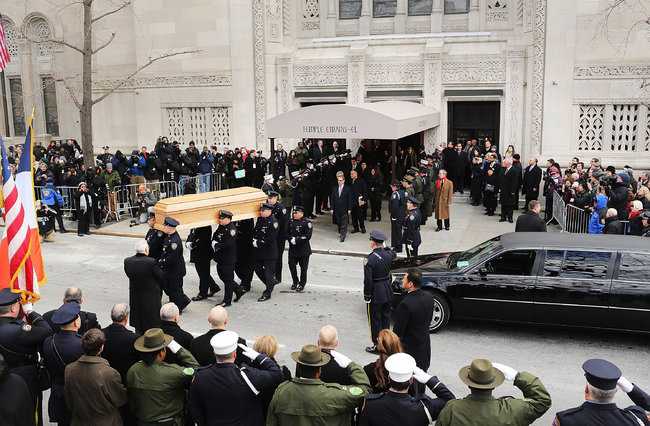Such was his public persona that it is arguably a compliment to remember Edward I. Koch as the P.T. Barnum of politics. Which is why it was so surreal watching him being accorded a serene state funeral in New York City on Monday – complete with a eulogy by former president Bill Clinton.
To be fair, that the New York Times dedicated an unprecedented amount of space on February 1 to his obituary is testament to the acclaim he achieved and the legacy he left behind.
 No politician has ever seemed as at ease in the slums of Skid Row as he was in the boardrooms of Wall Street, and his uppermost concern in both places was always, “How’m I doin?”
No politician has ever seemed as at ease in the slums of Skid Row as he was in the boardrooms of Wall Street, and his uppermost concern in both places was always, “How’m I doin?”
No less significant is that Koch is generally credited with leading the city from the brink of bankruptcy when he was first elected in 1978, to pinnacle of finance when he left in 1989.
As it happened, though, I lived in New York City for six of those years (1984-90). And what I remember most is that Koch seemed to be fiddling as political corruption, racial strife, and HIV/AIDS engulfed the city:
- The Times duly notes that the series of indictments and convictions for bribery, extortion, perjury and conspiracy, which affected various government agencies and led to the downfall of two of Koch’s top supporters, constituted “one of the worst corruption scandals in city history.”
- For most New Yorkers, five incidents epitomized the racial strife:
- A White cop shooting to death a 66-year-old Black woman, Eleanor Bumpers, pursuant to a simple eviction order in the Bronx.
- A pack of White teenagers hounding to death a Black teenager, Michael Griffiths, in Howard Beach.
- Another pack of White teenagers attacking and shooting another Black teenager, Yusuf K. Hawkins, in Bensonhurst.
- A Black teenager, Tawana Brawley, falsely accusing six White men, including cops, of raping her. (It is noteworthy that none of the men were ever even arrested).
- The police forcing false confessions out of five Black and Latino teenagers for the brutal assault and rape of the (White) Central Park jogger. (By contrast, it is noteworthy that, after spending over a decade in prison, the “Central Park Five” were all released after DNA evidence and the true confession of a serial rapist proved their innocence.)
- It is impossible to exaggerate the hysteria surrounding the spread of HIV in New York City during Koch’s tenure. Therefore, it smacks of a journalistic whitewash that the Times dedicated so few lines in its obit to what it quite properly referred to as his “slow, inadequate response to the AIDS crisis in the 1980s.” What’s more, given prevailing suspicions about Koch being a hermetically closeted homosexual, one can understand why gay activists condemned him as a Judas Iscariot who did not want to be associated in anyway with gays during these early days of this deadly disease.
Listen, there’s no question that some New Yorkers think I’m gay, and voted for me nevertheless. The vast majority don’t care, and others don’t think I am. And I don’t give a shit either way!
(Koch, New York magazine, April 6, 1998)
 There seems little doubt that this confluence of political corruption, racial strife and HIV/AIDS fatally undermined Koch’s efforts to win re-election to an historic fourth term in 1989. Not to mention 12 years of familiarity breeding some measurable degree of contempt.
There seems little doubt that this confluence of political corruption, racial strife and HIV/AIDS fatally undermined Koch’s efforts to win re-election to an historic fourth term in 1989. Not to mention 12 years of familiarity breeding some measurable degree of contempt.
But it speaks volumes about the nature of the alienation of affection among New Yorkers that he was defeated in a Democratic primary by David Dinkins – a relatively unknown city politician who went on to become the first and only Black to serve (for just one term) as mayor of New York City.
Koch (aka “Hizzoner”) never married (and was never linked romantically to any man or woman). He was plagued by medical problems in recent years, and finally died of congestive heart failure at New York Presbyterian/Columbia hospital a week ago today. He was 88.
Farewell, Ed.
